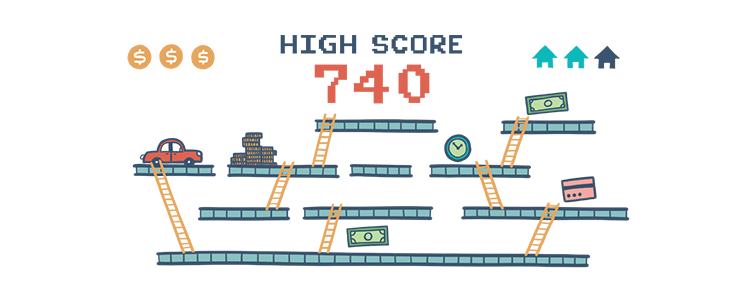Improve Your Credit History

First-time borrowers often have anxiety about low credit scores. They may not have a history of borrowing because they're young, they've never taken out a loan, or even had a credit card.
If you’re getting ready to shop for home mortgages, or any kind of large loan it’s a good idea to begin working on your credit history and getting that score up. To do that, it’s important to know the factors that affect your FICO score:
- Making payments on time: 35%
- Overall debt: 30%
- Length of credit: 15%
- New credit applications: 10%
- Types of credit: 10%
Know Your Score
You can only fix something when you know it’s broken, and knowing your credit score is the first step to helping it go up. Under the Fair Credit Reporting Act, you have a right to request your own credit report from a credit bureau to review it. This allows you to dispute any errors by writing to the relevant credit bureau, which must investigate the dispute within 30 days.
Start Building Credit
Starting a credit history is as simple as signing up for a credit card. Use a credit card to pay for everyday items and set up utility bill payments online through a credit card account in your name. Keep in mind to avoid accumulating debt by paying off the balance in a timely manner.
Don’t Let Your Balance Go Past-Due
Your payment history makes up 35% of your score, making it the most important factor of your credit. The more behind you are on your payments, the more it hurts your credit score. Try to pay off your outstanding balances in full rather than carrying it forward. In addition to avoiding interest payments, it will reflect favorably on your credit report when a lender updates your account status to "paid in full."
Don't Use ALL Your Credit
A key to scoring favorably on your credit is leaving most of it unused. Experts agree that if you use no more than 30% of your available credit, it affects your credit score positively. For example, if you have a 3 credit cards, two with a limit of $1,500 and one with a limit of $2,000, you have $5,000 total credit available. Keeping your combined balance under $1,500 (30% of $5,000) will help maintain a good credit score, because it shows lenders that you are able to use your given credit responsibly.
Avoid Applying for More Credit
When you apply for a new line of credit, lenders perform what is called a “hard inquiry” into your credit. This review of your credit itself affects your score. Applying for credit a number of times in a short timeframe sends a red flag to lenders who might assume that you’re in dire financial straits. So, if you are in the process of repairing a low credit score, avoid making any new applications for credit.

FHA Loan Articles
February 12, 2024When you are approved for an FHA One-Time Close Construction loan, you get a single loan that pays for both the costs to build the house, and serves as the mortgage. One application, one approval process, and one closing date.
November 22, 2023In the last days of November 2023, mortgage loan rates flirted with the 8% range but have since backed away, showing small but continued improvement. What does this mean for house hunters considering their options to become homeowners soon?
November 4, 2023In May 2023, USA Today published some facts and figures about the state of the housing market in America. If you are weighing your options for an FHA mortgage and trying to decide if it’s cheaper to buy or rent, your zip code may have a lot to do with the answers you get.
October 14, 2023FHA loan limits serve as a crucial mechanism to balance financial sustainability, regional variations in housing costs, and the agency's mission to promote homeownership, particularly for those with limited financial resources.
September 25, 2023Mortgage rates are hitting prospective homeowners hard this year and are approaching 8%, a rate that didn't seem very likely last winter. With so many people priced out of the market by the combination of high rates and a dwindling supply of homes.
September 19, 2023The FHA Handbook serves as a crucial resource for mortgage lenders, appraisers, underwriters, and other professionals involved in the origination and servicing of FHA-insured home loans. It outlines the policies and requirements for FHA-insured mortgages.








